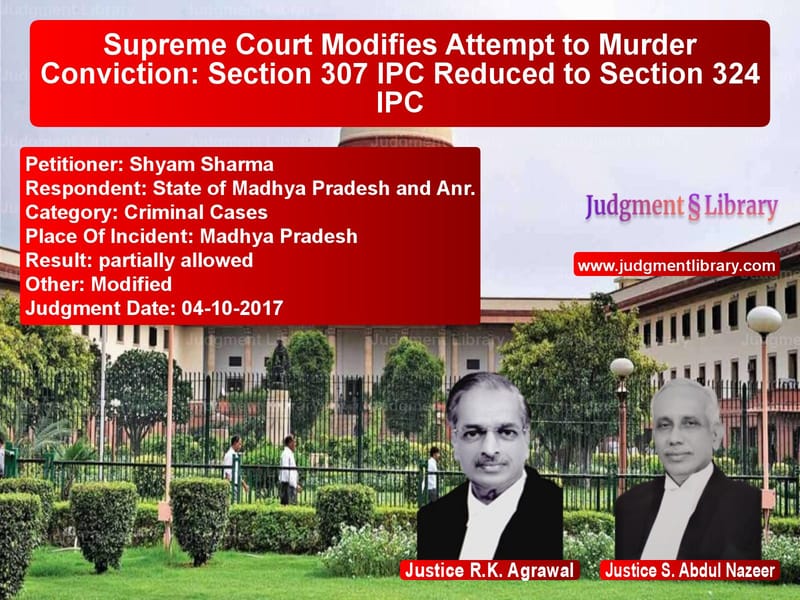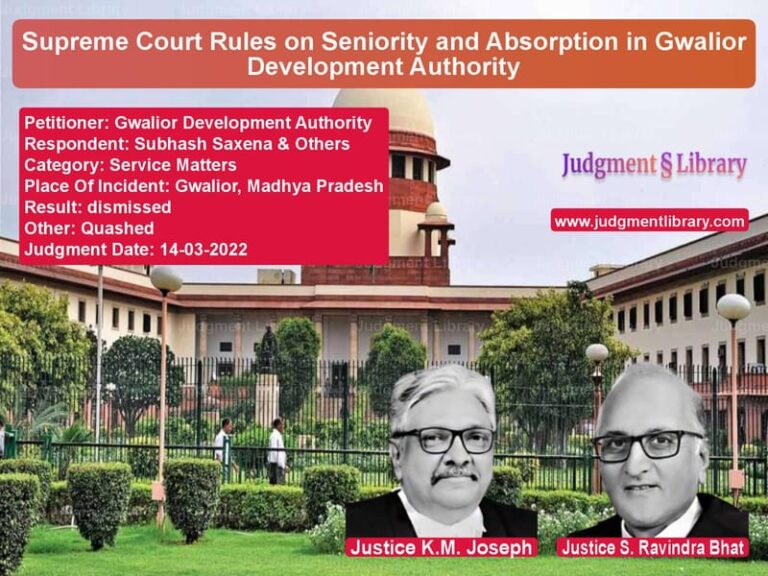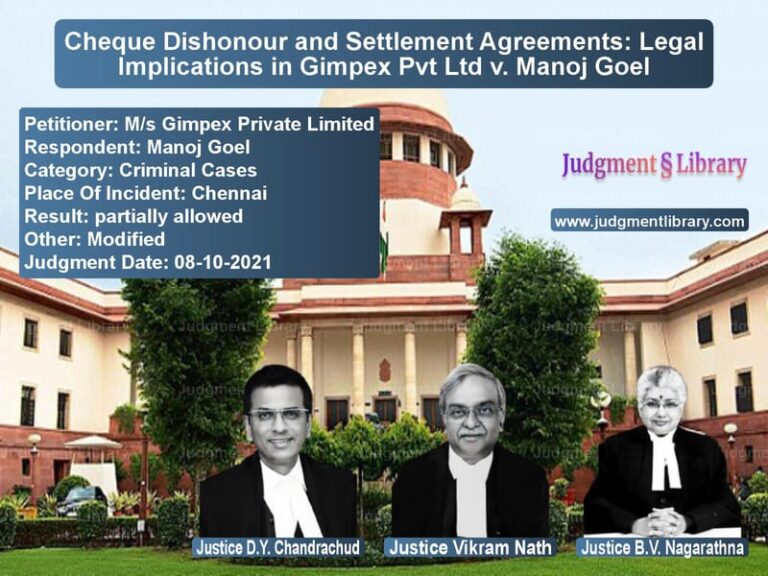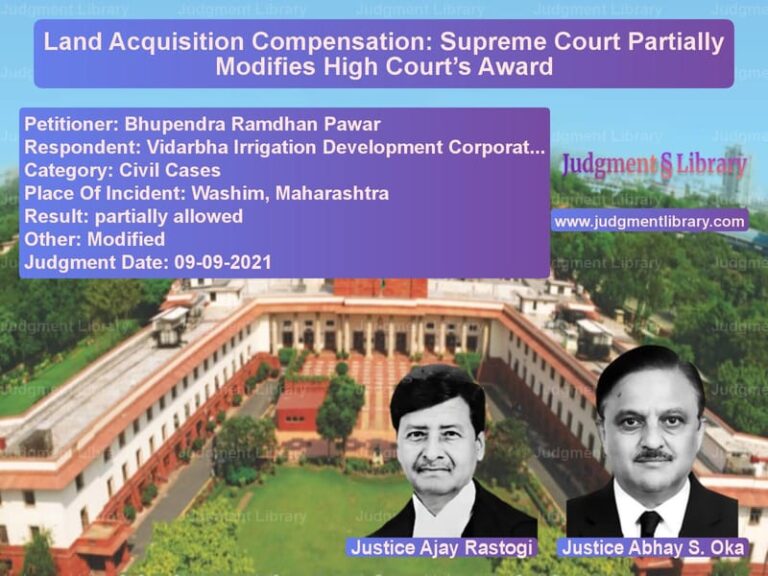Supreme Court Modifies Attempt to Murder Conviction: Section 307 IPC Reduced to Section 324 IPC
The Supreme Court of India recently ruled in the case of Shyam Sharma vs. State of Madhya Pradesh and Anr., addressing a crucial aspect of criminal law related to attempt to murder (Section 307 IPC) and its distinction from causing hurt (Section 324 IPC). The judgment highlights the importance of intent and the severity of injuries in determining the appropriate conviction under the Indian Penal Code (IPC).
The appellant, Shyam Sharma, had been convicted by the Sessions Court under Section 307 IPC for firing at the victim, Manjeet Singh, causing gunshot injuries. The conviction was upheld by the Madhya Pradesh High Court. However, the Supreme Court, after analyzing the evidence, modified the conviction to Section 324 IPC (voluntarily causing hurt by dangerous weapons) and reduced the sentence to the period already undergone.
Background of the Case
The case originated from an incident where the appellant, Shyam Sharma, was accused of firing a gun at Manjeet Singh, causing injuries to his shoulder and scapula region. The prosecution alleged that the attack was an attempt to commit murder, and the trial court convicted the appellant under Section 307 IPC, sentencing him to:
- Three years of rigorous imprisonment.
- A fine of Rs. 1,000.
- In default of payment, an additional five months of imprisonment.
The Madhya Pradesh High Court upheld the conviction and sentence. Aggrieved by the decision, the appellant approached the Supreme Court.
Arguments of the Appellant
Shyam Sharma’s defense, represented by senior counsel V. Giri, presented the following key arguments:
- Two independent witnesses, Anoop Bhargava (PW-1) and Ramprakash (PW-4), did not support the prosecution and turned hostile.
- The only primary witness against the appellant was Manjeet Singh (PW-3), who was an interested witness.
- The appellant was a computer engineer with no prior criminal record.
- The injuries sustained by Manjeet Singh were not on vital parts of his body, indicating the absence of intent to murder.
- The appellant’s actions were not premeditated.
Arguments of the Respondent (State of Madhya Pradesh)
The prosecution countered that:
- Manjeet Singh sustained gunshot injuries inflicted by the appellant.
- The medical evidence, provided by Dr. Vikram Singh Tomar (PW-2), confirmed two entry wounds on the victim’s left shoulder and upper scapula region.
- The prosecution had established the identity of the accused and the act of firing beyond reasonable doubt.
- The appellant had been correctly convicted under Section 307 IPC.
Supreme Court’s Key Findings
After reviewing the evidence and arguments, the Supreme Court ruled that the appellant’s conviction under Section 307 IPC was not justified. The key observations of the Court were:
“As rightly submitted by the learned counsel for the appellant, both Anoop Bhargava (PW-1) and Ramprakash (PW-4) have turned hostile. It was established that Manjeet Singh has sustained gunshot injury. However, firearm injury suffered by Manjeet Singh (PW-3) could not be impeached in their cross-examination.”
The Court further noted:
“It is also evident that the accused fired at Manjeet Singh without any pre-meditation. The injury suffered by Manjeet Singh was not on the vital part of his body. In our view, the prosecution has failed to prove that accused intended to cause the death of the deceased. Therefore, the appellant can only be convicted under Section 324 of the IPC and not under Section 307 of the IPC.”
Final Judgment
The Supreme Court modified the conviction and ruled as follows:
- The conviction under Section 307 IPC was set aside.
- The appellant was instead convicted under Section 324 IPC (voluntarily causing hurt by dangerous weapons).
- The sentence was reduced to the period already undergone (four months of imprisonment).
Key Takeaways from the Judgment
The ruling highlights several important legal principles:
- Distinction Between Attempt to Murder and Causing Hurt: The judgment emphasizes that an injury caused by a firearm does not automatically qualify as an attempt to murder unless there is a clear intent to cause death.
- Weight of Witness Testimony: The Court placed significant importance on the fact that two independent witnesses did not support the prosecution case.
- Relevance of Pre-Meditation: The ruling clarifies that premeditation is a key factor in determining an offense under Section 307 IPC.
- Importance of Injury Location: The Court noted that injuries not inflicted on vital organs indicate a lack of intent to kill.
- Judicial Leniency for First-Time Offenders: The appellant’s lack of prior criminal history was a crucial factor in reducing the sentence.
Legal Implications of the Judgment
This Supreme Court ruling has significant implications for criminal law in India:
- It clarifies that firearm injuries alone do not justify a conviction under Section 307 IPC.
- It underscores the necessity of proving intent beyond a reasonable doubt.
- It highlights the role of medical evidence in distinguishing between different degrees of assault.
- It reinforces the principle that first-time offenders should be treated with judicial leniency when appropriate.
Conclusion
The Supreme Court’s decision in Shyam Sharma vs. State of Madhya Pradesh serves as a landmark ruling in distinguishing between attempt to murder and causing hurt under the IPC. By modifying the conviction from Section 307 IPC to Section 324 IPC, the Court reaffirmed the importance of assessing intent and injury severity in criminal cases. This judgment will serve as a guiding precedent for future cases involving firearm injuries and the interpretation of criminal intent.
Don’t miss out on the full details! Download the complete judgment in PDF format below and gain valuable insights instantly!
Download Judgment: Shyam Sharma vs State of Madhya Prad Supreme Court of India Judgment Dated 04-10-2017.pdf
Direct Downlaod Judgment: Direct downlaod this Judgment
See all petitions in Attempt to Murder Cases
See all petitions in Bail and Anticipatory Bail
See all petitions in Fraud and Forgery
See all petitions in Judgment by R K Agrawal
See all petitions in Judgment by S. Abdul Nazeer
See all petitions in partially allowed
See all petitions in Modified
See all petitions in supreme court of India judgments October 2017
See all petitions in 2017 judgments
See all posts in Criminal Cases Category
See all allowed petitions in Criminal Cases Category
See all Dismissed petitions in Criminal Cases Category
See all partially allowed petitions in Criminal Cases Category







